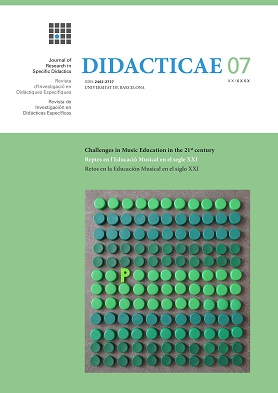Development-oriented learning approaches and the demand for an integrated understanding of teaching: A plea for more music in school
DOI:
https://doi.org/10.1344/did.2020.7.1-3Keywords:
imagination, creativity, integrated educationAbstract
Editorial - issue 7References
Cslovjecsek, M. (2009). „Alle müssen wollen“ - musikalische Aktivität im Klassenunterricht als Herausforderung und Chance. In H.-U. Grunder & A. Gut (Eds.), Zum Umgang mit Heterogenität in der Schule (Bd. 1, S. 82–92). Stuttgart: Schneider Verlag Hohengehren.
Cslovjecsek, M., & Zulauf, M. (Eds.). (2018). Integrated music ducation. Challenges of teaching and teacher training. Berlin: Peter Lang Editors.
Dewey, J. (1916). Democracy and education: An introduction to the philosophy of education. London: Macmillan.
Fischer, G. (2000). Social creativity, symmetry of ignorance and meta-design. Special Issue on “Creativity & Cognition 1999”. Knowledge-Based Systems, 13(7–8), 527–537.
Ryan, R. M., & Deci, E. L. (2000). Self-determination theory and the facilitation of intrinsic motivation, social development, and well-being. American Psychologist, 55, 68-78.
Swiss Curriculum - „Lehrplan 21“. (2016). Entwicklungsorientierte Zugänge. Retrieved from https://v-fe.lehrplan.ch
Zulauf, M., & Cslovjecsek, M. (2018). Lessons taken from the journey: Where next? In M. Cslovjecsek & M. Zulauf (Eds.), Integrated music education. Challenges of teaching and teacher training (pp. 399–410). Berlin: Peter Lang.
Downloads
Published
Issue
Section
License
Copyright (c) 2020 Markus Cslovjecsek

This work is licensed under a Creative Commons Attribution-ShareAlike 4.0 International License.
The authors who publish in this journal agree to the following terms:
- Authors retain copyright and grant the journal the right of first publication.
- Submitting a paper does not involve paying any fees.
- Texts will be published under a Creative Commons Attribution Share-Alike 4.0 International License that allows others to share the work, provided they include an acknowledgement of the work’s authorship, its initial publication in this journal and the terms of the license.
- When citing works published in Didacticae, both the autor and the journal must be cited.
- Didacticae does not accept any responsibility for the points of view and statements made by the authors.



